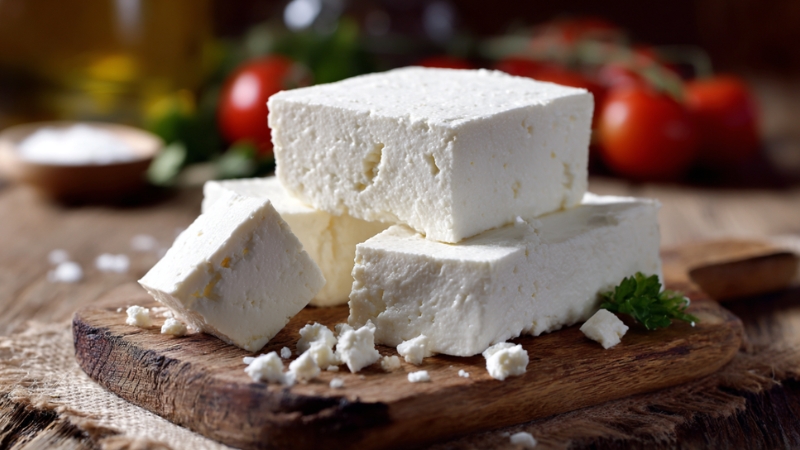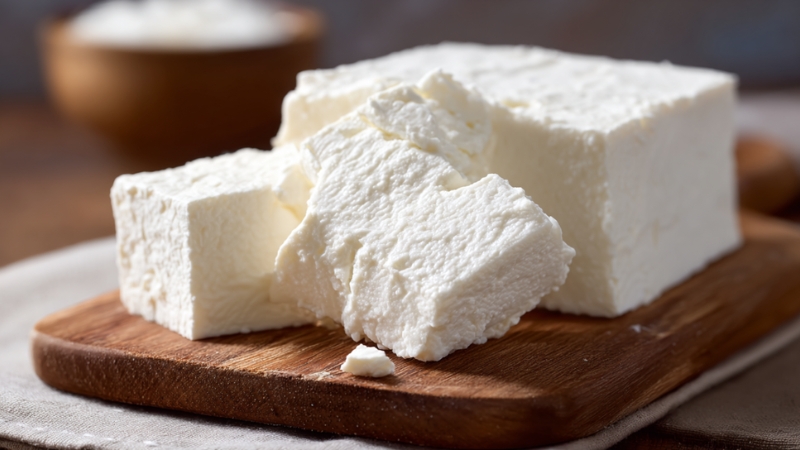Is Feta Cheese Vegetarian? Traditionally, No, But You Have Options
If you love salads, Mediterranean dishes, or anything sprinkled with that salty, tangy crumble of feta cheese, you might be surprised to learn that not all feta is vegetarian. In fact, traditional feta cheese isn’t vegetarian at all.
Traditional feta is a Greek cheese made primarily from sheep’s milk or a mix of sheep and goat’s milk, depending on the region. The cheese gets its distinctive tang from natural aging in brine, which also helps preserve it for months.
But the real key to feta’s texture and flavor isn’t the milk, it’s the enzyme used to separate curds from whey during cheesemaking. That enzyme is called rennet.
The Rennet Problem – Why Feta Is Traditionally Not Vegetarian

Rennet is a complex of enzymes that coagulates milk, turning it into solid curds and liquid whey. For centuries, cheesemakers used animal rennet, which is extracted from the stomach lining of unweaned calves, lambs, or goats. This traditional source is why most authentic feta is not vegetarian.
The issue isn’t about flavor or quality; it’s purely ethical. Since animal rennet comes from slaughtered animals, any cheese made with it doesn’t meet vegetarian dietary standards, even though it doesn’t contain visible meat.
In Greece, where feta is protected under PDO (Protected Designation of Origin) law, producers are required to use traditional methods, including animal rennet, to label their cheese “feta.” That means authentic Greek feta sold in the EU is almost always non-vegetarian.
Vegetarian Alternatives: The Modern Twist on Feta
Fortunately, the demand for vegetarian-friendly cheeses has grown sharply in recent years. Many dairies and global producers now use microbial or plant-based rennet instead of animal rennet, allowing vegetarians to enjoy the same flavor and crumble without compromise.
Types of Rennet Used Today
Type of Rennet
Source
Vegetarian?
Notes
Animal rennet
Enzymes from calf, lamb, or goat stomachs
No
Traditional and still common in PDO Greek feta
Microbial rennet
Produced by fungi or bacteria (fermentation-derived)
Yes
Most common vegetarian replacement; widely used in supermarket feta
Plant rennet
Extracted from thistle, nettle, or fig sap
Yes
Used in some artisanal or small-batch cheeses
Genetically engineered chymosin
Enzyme identical to calf rennet but made using microbial fermentation
Yes
Considered vegetarian-safe; widely used in large-scale cheese production
When feta is made with microbial or fermentation-produced chymosin, it achieves the same texture, saltiness, and sharp flavor as traditional versions, and most consumers can’t tell the difference.
How to Tell If Your Feta Is Vegetarian
View this post on Instagram
Labels are your best friend. Look for terms like:
- “Suitable for vegetarians” or “Made with microbial rennet.”
- Avoid products that list “animal rennet” or “traditional rennet” unless the manufacturer specifically clarifies it’s vegetarian.
- Check certifications in the UK, the Vegetarian Society Approved logo ensures animal-free rennet was used.
Some popular vegetarian-friendly feta brands include:
Brand
Rennet Type
Vegetarian?
Region Available
Athenos Crumbled Feta
Microbial
Yes
North America
Violife Greek White Block
100% Vegan (no dairy)
Yes
Global
President Feta Crumbles
Microbial
Yes
U.S. & EU
Tesco Greek-Style Feta
Microbial
Yes
UK & EU
Authentic Greek PDO Feta (e.g., Dodoni, Valbreso)
Animal
No
EU & Worldwide
If you’re shopping abroad, check whether the label says “Greek-style” or “feta-style.” The latter usually means it’s not made under PDO rules, giving producers flexibility to use vegetarian enzymes.
Vegan Alternatives for Feta Lovers

If you’re avoiding all animal products, including dairy, there’s good news. The market for vegan feta has exploded in recent years.
These cheeses are typically made from coconut oil, tofu, cashews, or almonds, often seasoned with lemon juice and salt to mimic feta’s briny tang.
Brands like Violife, Follow Your Heart, and Miyoko’s Creamery offer plant-based feta blocks that crumble and melt almost exactly like the real thing.
For a homemade version, you can marinate cubed tofu in olive oil, lemon, and apple cider vinegar to achieve a similar salty flavor.
Why Authenticity and Ethics Sometimes Collide
There’s an interesting cultural tension here. Greek cheesemakers argue that animal rennet is essential to feta’s authenticity; the texture, aging process, and flavor profile depend on it.
But global consumers are increasingly looking for ethical, sustainable options that align with vegetarian or vegan lifestyles.
The result is a growing divide between “authentic” Greek feta, which maintains its PDO status and uses animal rennet, and “Greek-style feta,” which can be produced anywhere and uses vegetarian enzymes. Both have their place; one preserves heritage, the other broadens accessibility.
The Bottom Line
@liveeatlearn Feta cheese is one of the easiest cheeses to make a vegan version of at home! Here’s how 🇬🇷 #vegancheese ##fetacheese##tofurecipe ##CapCut ♬ Greek Music – Dar Golan
So, is feta cheese vegetarian?
- Traditional Greek feta: No, it’s made with animal rennet.
- Many modern or supermarket feta brands: Yes, if they use microbial or plant-based rennet.
- Vegan alternatives: Completely plant-based, dairy-free options are now widely available.
If you’re vegetarian and don’t want to give up your favorite cheese, check labels carefully or opt for “Greek-style” feta rather than PDO “Greek feta.” The taste difference is minimal, but the ethical peace of mind is significant.
Hello, my name is Marina Vlasov. Im currently trying to change my career from my current job to becoming a chef. It is a hard road, but I feel like im coming there soon. While I enjoy preparing practically all food, from various cuisines from all over the globe, I must say that I mostly enjoy preparing vegan food. That is my strongest side. That is why I want to provide you with the best vegan food recipes on this blog of mine.

